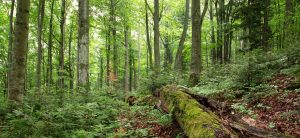BC Chamber Raises Objections To Controversial Forestry Announcement

PORT ALBERNI – Huu-ay-aht First Nations will not implement the provincial Ministry of Forests, Lands, Natural Resource Operations’ proposed old growth deferrals announced November 2.
The controversial announcement was based on recommendations from the Old Growth Technical Advisory Panel established by the B.C. government in June.
A BC Chamber of Commerce press release cited a BC Council of Forest Industries (COFI) statement predicting the deferrals “could result in the shutdown of 14 to 20 sawmills, two pulp mills and an undetermined number of value-added manufacturing facilities.”
A statement released by the Huu-ay-aht Nation the same day states “We were advised that the BC government will not implement any further deferrals within our hahuuli without our prior agreement arrived at through government-to-government engagement.
“As a Modern Treaty Nation, Huu-ay-aht will decide what is best for our people. Our citizens have a constitutionally protected right to manage and benefit from our lands, waters, and resources throughout our ḥahuułi.”
In announcing its hosting of the Anacla Old-Growth Summit on November 23, the Nation stated: “If large scale deferrals are announced and implemented, this would have severe adverse impacts on the safety and economic well-being, cultural and spiritual survival of our people, and the sustainability of our lands.”
“The need for large scale deferrals would likely be justified by reliance on the untested assertion in 2020 by technical advisors to BC that there is only three per cent of productive old growth left in BC. Other forestry technical advisors say there is 30 per cent of similarly labelled productive old growth left within a highly protected land-base. As the rights and title holders who make the final decisions on forestry in our Territory, Huu-ay-aht needs to close this science gap.”
The Summit will be hosted by Head Hereditary Chief Derek Peters and Elected Chief Councillor Robert J. Dennis Sr., and its purpose is to hear from forestry professionals regarding discrepancies in the scientific data related to old growth (the “science gap”) and discuss Huu-ay-aht’s approach to old growth management and the Integrated Resource Management Plan process.
Fiona Famulak, President and CEO of the BC Chamber, says “British Columbia’s forest industry is an important economic generator in communities – both rural and urban. These deferrals will have far-reaching consequences. Not only will forestry companies be impacted, so too will the small- and medium-sized businesses that supply the industry with goods and services, and the communities in which they operate.
“These businesses are located in every single region of the province, from the lower mainland, to the Island, in the north, and the interior. What is especially concerning for the BC Chamber network is this decision is coming at a time when many businesses are still struggling to overcome the challenges of the pandemic.”
COFI estimates that, if implemented, this policy could represent the loss of approximately 18,000 family-supporting jobs, including in Indigenous communities, along with more than $400 million in lost revenues to the provincial government per year.


